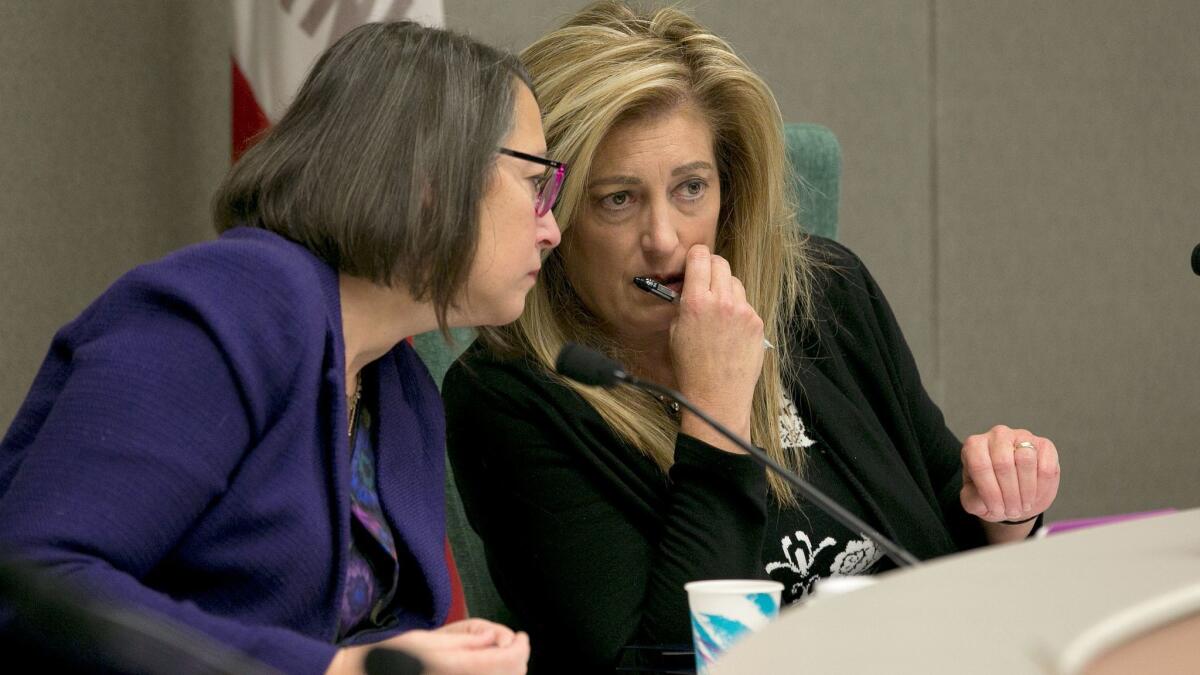California Journal: I finally understand why male politicians have been able to sexually harass women with impunity

For the last two months, Americans have watched in disbelief as sexual harassers have been called to account.
The #MeToo campaign on social media and a flood of investigative stories have given women the courage to speak up, which has forced employers to step up.
For the record:
12:00 a.m. Dec. 5, 2017Lobbyist Samantha Corbin was quoted incorrectly. She did not say if a committee chairman asked her out, “it is harassment.” She said, “I would certainly feel pressured.”
The alleged modus operandi of movie mogul Harvey Weinstein, political analyst Mark Halperin and talk show hosts Charlie Rose and Matt Lauer crossed vivid lines. They became liabilities to shareholders, advertisers, customers and ratings. They had to be fired.
But what about public officials, who have no bosses except for their constituents? How should their transgressions be handled? And what, exactly, are the rules?
This was the question at the heart of a marathon state Assembly hearing last week. Convened by Democratic Assemblywoman Laura Friedman, who chairs the Rules Subcommittee on Sexual Harassment, Discrimination and Retaliation Prevention, the nearly six-hour hearing established that the California Legislature has a very detailed sexual harassment policy that does almost nothing to protect women.
There is no tracking system for complaints and investigations. There is no coordination with the state Senate. The policy calls for “zero tolerance” against harassment, but no one has any idea what that means.
Also, there are conflicting views about what constitutes harassment, along with a widespread belief, as Friedman put it, that “members are to be protected at all costs.”
“Many complaints come in that may not necessarily violate policy,” explained Rules Committee Chief Administrative Officer Deborah Gravert. “An individual can come in and say, ‘This person asked me out on a date.’ As long as it’s not out of the ordinary — or every day, or every other day, ‘I want you to go out with me’ — one person asking another to go out on a date does not violate policy.”
A number of women in the audience gasped.
“Earlier it was said that asking someone out on a date is not harassment. I would beg to differ,” said lobbyist Samantha Corbin, who coordinated a letter, signed by 140 female lobbyists, elected officials and staffers, demanding an end to Sacramento’s culture of harassment. “Because if the chair of Appropriations was to ask me out on a date, I would certainly feel pressured.”
But is pressure the same as sexual harassment?
“A single act of asking somebody out, under the law, is probably not actionable,” said Leslie Levy, an Oakland employment discrimination attorney. To be considered illegal, she said, courts have ruled harassment must be “severe or pervasive.” But the power imbalance puts a staffer in an untenable position.
Even relationships that appear consensual can be exploitative, wrong and damaging to the less powerful person. (Look no further than President Clinton’s misbegotten affair with Monica Lewinsky.)
So maybe a politician won’t go to jail if he asks a staffer out. But it’s wrong, and there should be a policy against it.
::
My favorite moment of last week’s hearing was the unintentional blooper uttered by Democratic Assemblyman Ken Cooley, chairman of the Rules Committee.
“Does anyone here believe the current policy is working?” Republican Assemblyman Vince Fong asked Cooley.
“I think it’s working,” replied Cooley, “but it’s not achieving its intended purpose.”
No kidding.
“I went from being the fabulous legislative director to not being able to put a bill across the desk,” said Nancy Kathleen Finnegan, who received a $100,000 settlement of taxpayer dollars after accusing Palmdale Democratic Assemblyman Steve Fox of exposing himself to her, which he has denied. “I was so terribly maligned.”
In district offices especially, interns and junior staffers feel isolated and afraid.
“I recently spoke out about a difficult experience I had with a former assembly member who is now a senator,” said Capitol staffer Jennifer Kwart.
She told the Sacramento Bee that in 2008, when she was a 19-year-old intern in the Los Angeles office of then-Assemblyman Tony Mendoza, he took her to his hotel room during a Democratic Party convention in San Jose and supplied her with drinks. (Mendoza, who has been accused of repeatedly inviting a young woman seeking career advice to his home, has been stripped of his leadership positions by the Senate Rules Committee, pending the outcome of an investigation.)
“Interns are the most vulnerable and susceptible to this behavior,” Kwart said. “They have little power and almost no information. But I would not have known who to tell. I would not have put two and two together that the Rules Committee is the human resources arm of this body. I did not have an ally. I just felt very alone.”
Kwart is now district director for San Francisco Democratic Assemblyman David Chiu, who has publicly expressed doubts about Mendoza’s fitness for office.
::
One of the most gratifying aspects of this long-overdue reckoning is that women are finally being believed. Patterns of abuse can no longer be denied.
Even if they don’t report abuse to authorities, they do tell. They tell their friends, co-workers, spouses and lovers, who corroborate their stories. They warn other women in “whisper networks.”
On Monday, lobbyist Pamela Lopez filed a complaint against San Fernando Valley Democratic Assemblyman Matt Dababneh, alleging that he masturbated in front of her in a Las Vegas bathroom in 2016. Moments later, Jonathan Bash, who was president of UCLA’s student Democrats, tweeted, “Since 2010, UCLA @BruinDemocrats have advised against interning with #MattDababneh. Whisper network was necessary to protect members.”
Friedman’s subcommittee meets again in January. She has vowed to create a way for victims to testify anonymously. And she has promised to create a hot line for complaints and counseling, and to inform every staff member in district offices, where victims can feel so isolated and powerless, of their rights.
“I am deeply committed that this is not just about talk,” Friedman said.
The whispers, it seems, are finally becoming shouts.
To read the article in Spanish, click here
Twitter: @AbcarianLAT
ALSO
President Trump chides Matt Lauer and NBC over sexual harassment firing? Look in the mirror, man
Female lawmakers, staffers and lobbyists speak out on ‘pervasive’ harassment in California’s Capitol
More to Read
Get the L.A. Times Politics newsletter
Deeply reported insights into legislation, politics and policy from Sacramento, Washington and beyond. In your inbox three times per week.
You may occasionally receive promotional content from the Los Angeles Times.











